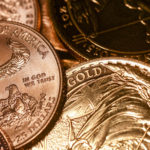Is Russia really on the ropes: Could it sell its gold?
(December 24, 2014 - by Lawrence Williams)
The problem with most of those delighting in Russia’s apparent comeuppance for what the West views as its expansionary destabilising tactics in Crimea and Donbass is that they aren’t Russian. They assume Russians will act like Americans or western Europeans to a financial crisis and come rushing back, cap in hand, to beg forgiveness, return Crimea to its Ukrainian masters and withdraw any troops it may, or may not, have in Donbass. They should perhaps listen instead to Sergey Lavrov, the highly plausible and cultured Russian Foreign Minister who comments that Russia has survived such adversities in the past, and come out stronger as a result.
Yes, Lavrov is talking to his, and his masters’, own political book but he also has a point. Look at President Putin’s domestic popularity ratings. They are riding at levels any western politician would give his or her eye teeth for. Russians are a proud people who feel they were taken to the cleaners by the West pre-Putin during the break-up of the Soviet Union and now have a strong leader in charge who is putting Russia back on the map as a world power.
Russia is not a rich nation by any standards. True there are some exorbitantly rich individuals and a growing middle class but the bulk of the population remains very poor by Western standards and feels it has nothing to lose anyway. Those featuring in the Western media as suffering horrendously because their low interest dollar loans may now drive them into bankruptcy as the ruble dives against the dollar are but a minute fraction of the population. The huge majority of Russians don’t have mortgages or dollar loans and while resultant inflation may eat into what little they do have, as Lavrov points out, they’ve been there before and come out stronger.
There is a strong feeling in Russia, no doubt promulgated by state controlled media, that the current financial crisis has been orchestrated by the U.S.-led West with sanctions and it views the rapid collapse of the oil price – the other major contributor to the nation’s economic problems – as also being politically driven by the U.S. and its ally Saudi Arabia. Instead of dividing opinion against the Russian Government this looks so far to have only united opposition to the West, ans support for President Putin’s policies, amongst the Russian general public.
And as for Russian gold. The country has been building its gold reserves at a strong rate and there is little or no indication that it plans to sell any of this to relieve the strain on the ruble, but is far more likely to run down its foreign currency reserves before it even looks at selling gold as an option. We are pretty sure that the Russian Central Bank has actually continued to buy gold in November and we should have the latest figures on this at the end of this week. However the really sharp decline in the ruble against the dollar has only happened over the last week or so, so perhaps the November figures will not be a good guide to the very latest Russian Central Bank gold buying policy.
But the West should tread warily. Russia is convinced of the view that the downfall of the Yanukovych Presidency in the Ukraine was totally orchestrated by the U.S. and its allies when it became apparent that he was leaning towards retaining economic ties to the Russian Federation
rather than the EU. Much of Russia’s subsequent response to ‘protect’ the ethnic Russians in Crimea and more recently in Donbass has been down to this, plus the perception in Moscow that the new Ukrainian government was anti-ethnic Russian and was to be dominated by ultra-right wing fascist leaning political groups (which is incorrect, although the right wing elements are still a powerful force and their militia involvements may well be largely responsible for the failure of the various ceasefire agreements in the southeast). There was also the real fear, – there still is – that the new Ukrainian government will push to join NATO and advance that alliance’s military presence right up to the south west Russian border. Russia sees NATO encroachment as a major threat to it militarily, while the West regards the changes in the Ukraine and it joining the EU as integral part of the process of bringing true Western style democracy to Eastern Europe, while many within the western alliance would look upon expanding NATO as an important part of this.
Was it ever thus? In the olden days the Crusades pitted Christian Western Europeans against Arab Muslims for the control of the Holy Land. Nowadays it is not religious rivalries, but political dogma which drives such adventures and there is a real danger here that both the West and Russia will talk each other into military conflict as each side ups the ante to gain perceived political advantage.
Russia’s President Putin has a strong-man image to maintain, while the USA’s President Obama also feels the need to project his country’s strength of commitment to Europe, but this theatre is a long way from American soil so his fellow Americans don’t feel threatened. But President Putin does feel threatened. NATO in the Ukraine is Putin’s Cuban missile crisis. (Ironic given that the 50 year break in relations between the US and Cuba looks about to end. It should also be noted that the 50 years of sanctions against Cuba never even brought that tiny nation to its knees!) Putin thus sees NATO in Ukraine as a step too far by the West and it seems to this observer unlikely that a Western-initiated economic war against Russia will deter him from keeping at least a part of Ukraine on side – and if this requires an escalation of military involvement he would certainly have ground and supply advantage.
One strongly hopes it will not come to this. The potential for escalation is enormous. Maybe a Federal solution for the Ukraine is the answer, although the current government is strongly opposed to what it sees as fragmentation of its control – but even a Federation seems unlikely to get Crimea back.
The long and the short of it is that Western sanctions are unlikely to bring Russia to its knees. Its economy was in a worse mess in 2008/9. The declining ruble creates problems, but Russia has been building trade alliances with friendly states – notably China and its former satellites – and is taking other measures to avoid having to trade in U.S. dollars and the long term result here may well be yet another contributor to global reserve currency reform, perhaps over the next decade or so. Russia sees having strong gold reserves as a key element in any future reserve currency realignment which it why this observer feels it unlikely it will dip into its gold reserves to any significant extent as a method of trying to arrest the ruble’s fall. Indeed it has already stated it is willing to sell its currency reserves to do this.






